กิจกรรมเนื่องในวันป่าไม้สากล 2566 International Day of Forests 2023
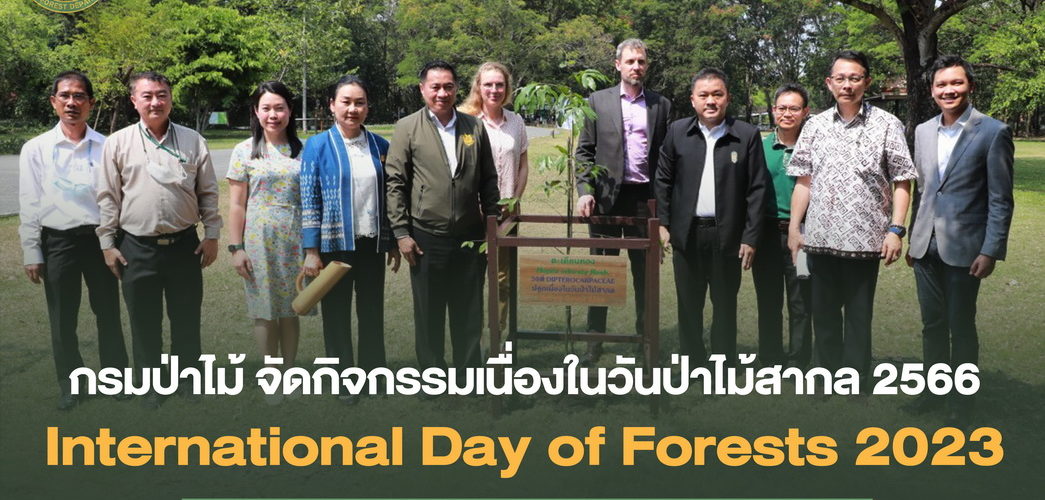

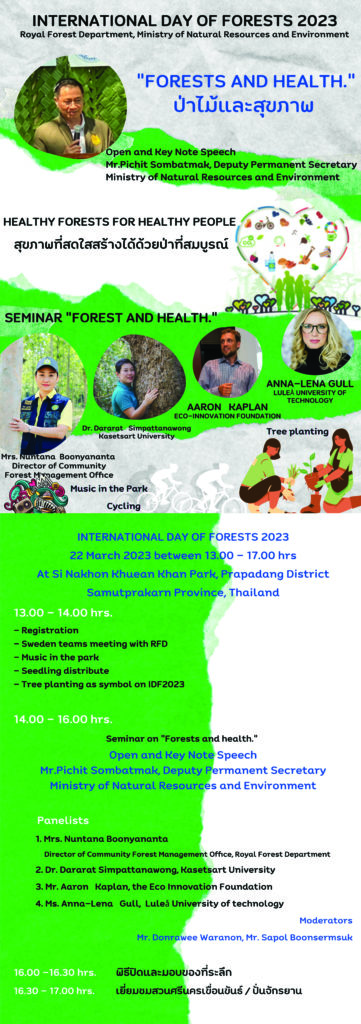

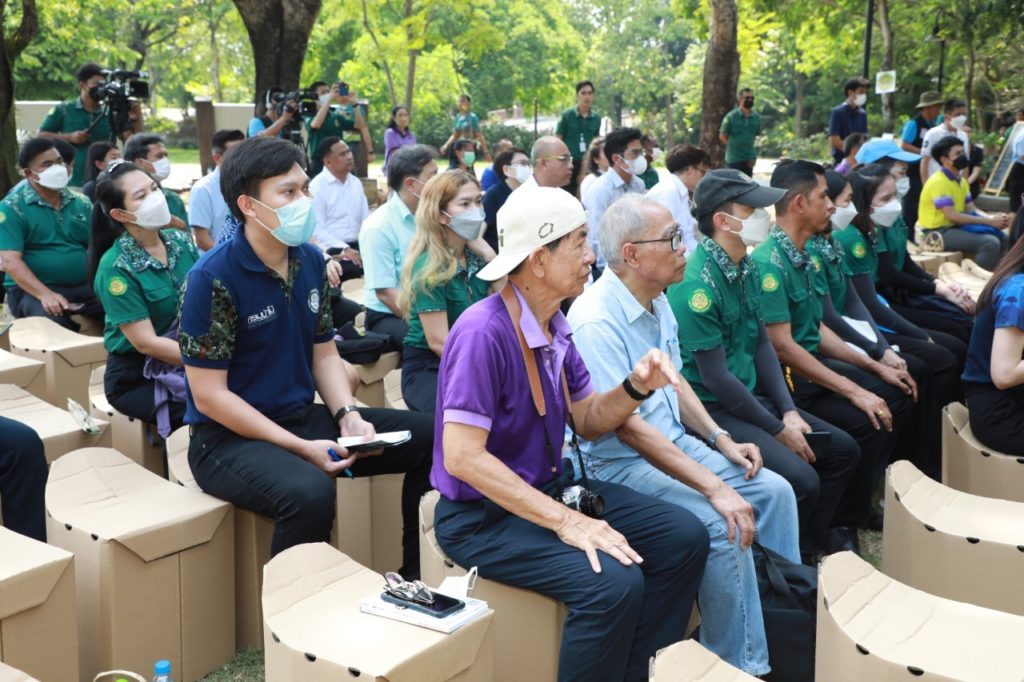




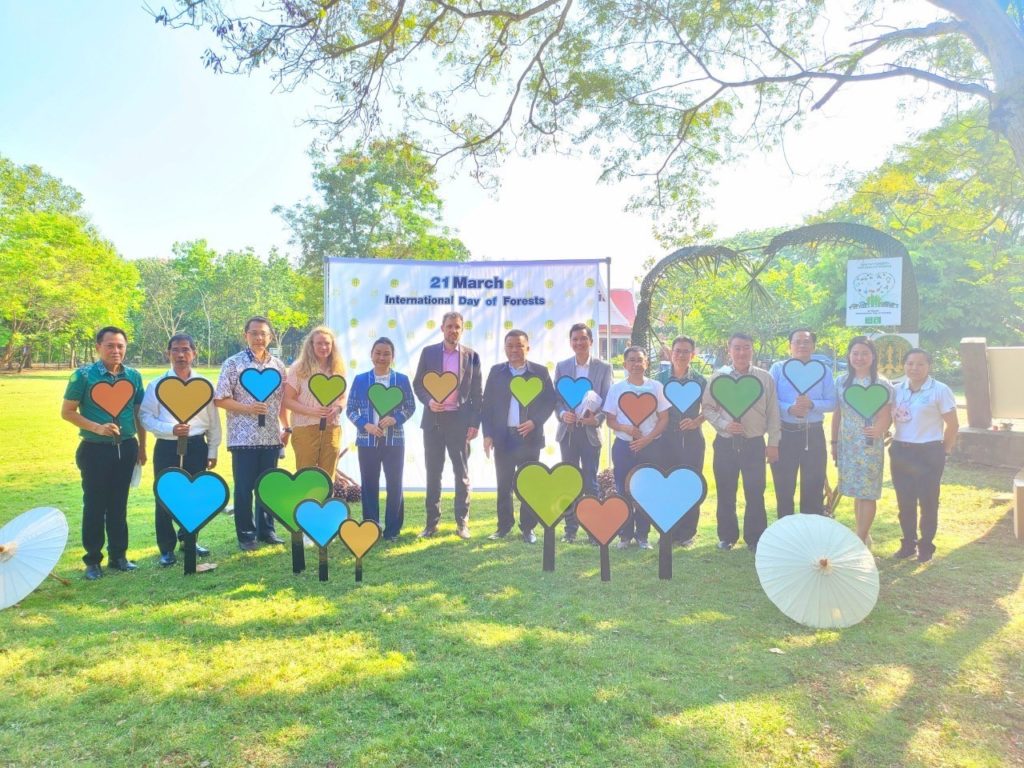
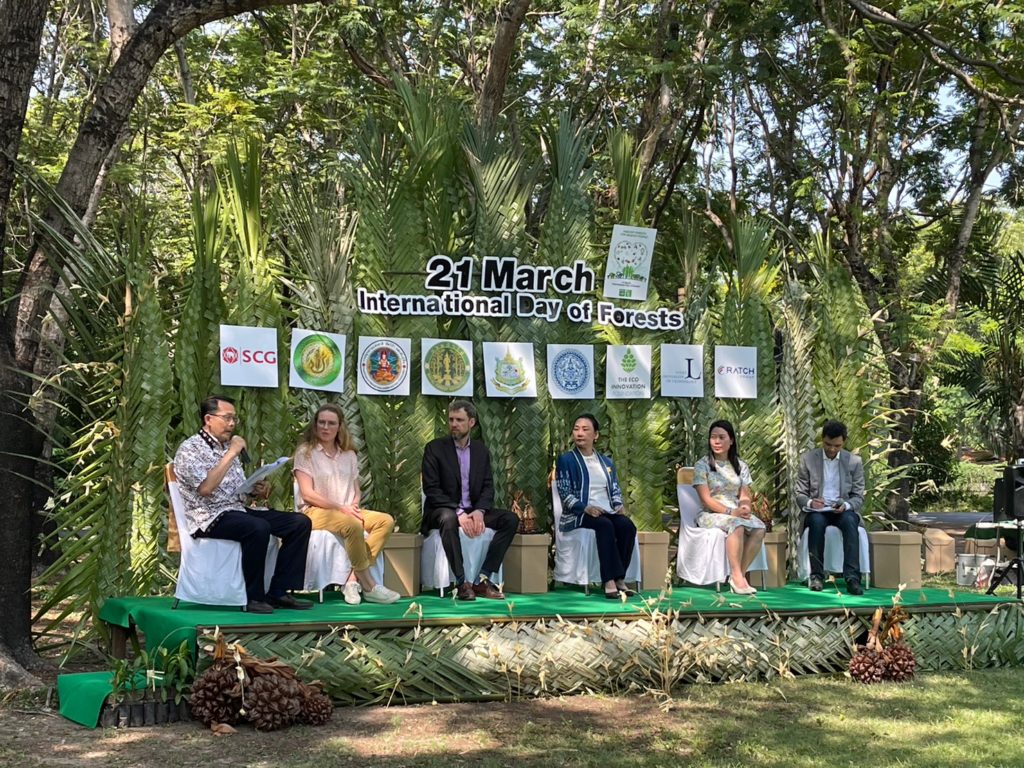
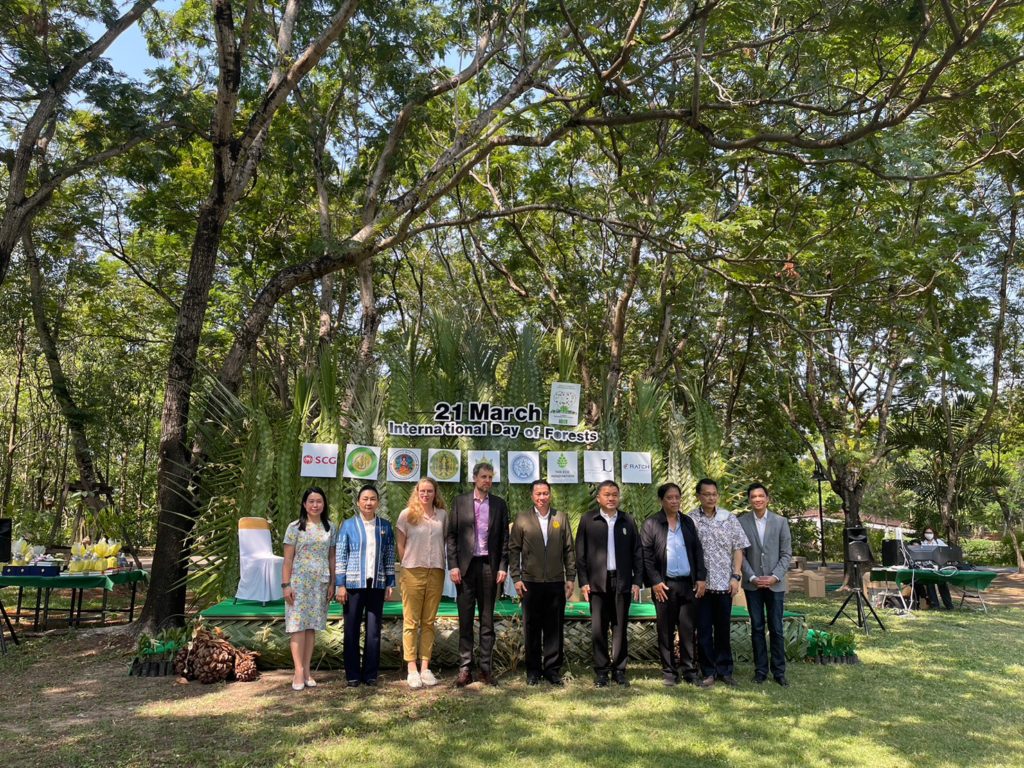



วันป่าไม้สากล
สัมมนาหัวข้อ “ป่าและสุขภาพ”
แนวคิด:
สมัชชาใหญ่แห่งสหประชาชาติประกาศให้วันที่ 21 มีนาคมเป็นวันป่าไม้สากล (International Day of Forests – IDF) เพื่อเป็นการเฉลิมฉลองและสร้างความตระหนักถึงความสำคัญของป่าไม้ทุกประเภท ในวันป่าไม้สากลแต่ละวัน ประเทศต่าง ๆ ได้รับการสนับสนุนให้ดำเนินการในระดับท้องถิ่น ระดับชาติ และระดับนานาชาติเพื่อจัดกิจกรรมเกี่ยวกับป่าและต้นไม้ เช่น การรณรงค์ปลูกต้นไม้
ประเด็นหลักสำหรับวันป่าไม้สากลแต่ละวันได้รับเลือกโดย Collaborative Partnership on Forests ประเด็นหลักสำหรับปี 2023 คือ “ป่าไม้และสุขภาพ” ซึ่งเน้นให้เห็นความเชื่อมโยงระหว่างธรรมชาติกับความเป็นอยู่ของมนุษย์ ป่าไม้ให้บริการระบบนิเวศที่สำคัญ เช่น การควบคุมสภาพอากาศ การทำอากาศและน้ำให้บริสุทธิ์ และการสนับสนุนความหลากหลายทางชีวภาพ นอกจากนี้ ป่าไม้ยังมีประโยชน์ต่อสุขภาพของมนุษย์อย่างมาก ทั้งประโยชน์ทางร่างกาย จิตใจ และสังคม ป่าไม้ได้รับการยอมรับมาอย่างยาวนานในด้านผลการรักษาและการฟื้นฟู และมีหลักฐานเพิ่มขึ้นเรื่อย ๆ ว่าการใช้เวลาในธรรมชาติสามารถส่งผลดีต่อสุขภาพกายและสุขภาพจิตของเรา
ข้อมูลจากหนังสือของ FAO เรื่อง “Forests for Human Health and Well-being Strengthening the forest–health–nutrition Nexus” แสดงให้เห็นว่าป่าไม้ให้ประโยชน์ด้านสุขภาพที่สำคัญแก่ทุกคนทั้งทางตรงและทางอ้อม คุณภาพของป่าที่ส่งเสริมสุขภาพเป็นผลจากผลประโยชน์หลายด้านที่เกื้อหนุนกัน สำหรับชุมชนหลายแห่งในและใกล้ป่า ทั้งในประเทศกำลังพัฒนาและประเทศที่พัฒนาแล้ว ระบบนิเวศป่าที่อุดมด้วยความหลากหลายทางชีวภาพให้ผลผลิตที่กินได้ซึ่งนำไปสู่อาหารเพื่อสุขภาพ เช่น ผลไม้ ใบไม้ และเห็ด รวมทั้งพืชสมุนไพรอีกจำนวนมาก บริการด้านสิ่งแวดล้อมป่าไม้รวมถึงการจัดหาทรัพยากรน้ำจืด การควบคุมน้ำท่วม ความอุดมสมบูรณ์ของดิน การควบคุมสภาพอากาศในระดับจุลภาค และที่อยู่อาศัยสำหรับความหลากหลายทางชีวภาพ อย่างไรก็ตาม ป่าไม้ยังส่งผลต่อสุขภาพของมนุษย์ในทางตรงน้อยกว่า และสำหรับผู้คนที่เกี่ยวข้องโดยตรงกับที่อยู่อาศัยของป่าน้อยกว่า รวมถึงผู้ที่อาศัยอยู่ในเขตเมืองด้วย ในบทบาทโดยรวมของป่าต่อสุขภาพของมนุษย์ แนวคิดเรื่องสุขภาพจะต้องเข้าใจอย่างกว้างขวาง ซึ่งรวมถึงไม่เพียงแต่การรักษาโรคที่ได้รับการวินิจฉัยเท่านั้น แต่ยังรวมถึงวิธีการรักษาสุขภาพและความเป็นอยู่ที่ดี และป้องกันการเจ็บป่วยด้วย
โดยในปีวันป่าไม้สากล ได้เน้นในประเด็นดังนี้
ป่าไม้เป็นแหล่งอาหารและโภชนาการที่สำคัญ
เกือบหนึ่งพันล้านคนทั่วโลกดำรงชีวิตขึ้นอยู่กับการเก็บเกี่ยวอาหารป่า เช่น สมุนไพร ผลไม้ ถั่ว เนื้อสัตว์ และแมลง เพื่อเป็นอาหารที่มีประโยชน์ ในพื้นที่เขตร้อนที่ห่างไกลบางแห่ง การบริโภคเนื้อสัตว์ป่าคาดว่าจะครอบคลุมระหว่าง 60 – 80 เปอร์เซ็นต์ของความต้องการโปรตีนในแต่ละวัน
ป่าไม้คือร้านขายยาตามธรรมชาติ
พืชประมาณ 50,000 ชนิด ซึ่งหลายชนิดเติบโตในป่า มีคุณค่าทางยา ชุมชนท้องถิ่นใช้ยาที่ได้จากป่าสำหรับโรคภัยไข้เจ็บต่างๆ และยารักษาโรคทั่วไปจำนวนมากได้มาจากพืชป่า รวมทั้งยารักษามะเร็งจากหอยขมมาดากัสการ์และยารักษาโรคมาลาเรียควินินจากต้นซิงโคนา
ป่าที่สมบูรณ์ปกป้องเราจากโรค
ป่าไม้ทำหน้าที่เป็นเกราะป้องกันตามธรรมชาติในการแพร่กระจายโรคระหว่างสัตว์และมนุษย์ แต่เมื่อมีการตัดไม้ทำลายป่าอย่างต่อเนื่อง ความเสี่ยงของโรคที่แพร่กระจายจากสัตว์สู่คนก็เพิ่มสูงขึ้น มากกว่าร้อยละ 30 ของโรคใหม่ที่มีรายงานตั้งแต่ปี 2503 มีสาเหตุมาจากการเปลี่ยนแปลงการใช้ที่ดิน ซึ่งรวมถึงการตัดไม้ทำลายป่า
ป่าไม้ช่วยเพิ่มสุขภาพจิตและร่างกายของเรา
การใช้เวลาในป่าจะเพิ่มอารมณ์เชิงบวก และลดความเครียด ความดันโลหิต ความหดหู่ ความเหนื่อยล้า ความวิตกกังวล และความตึงเครียด ต้นไม้ในเมืองยังดูดซับก๊าซมลพิษจากการจราจรและอุตสาหกรรม และกรองฝุ่นละอองขนาดเล็ก เช่น ฝุ่น ดิน และควัน ซึ่งช่วยปกป้องประชากรในเมืองจากโรคระบบทางเดินหายใจ
ป่าไม้มีบทบาทสำคัญในการต่อสู้กับภัยคุกคามด้านสุขภาพที่ใหญ่ที่สุดที่มนุษยชาติต้องเผชิญ ซึ่งก็คือการเปลี่ยนแปลงสภาพภูมิอากาศ
ป่าไม้ที่สมบูรณ์ช่วยควบคุมภาวะโลกร้อน ป่ามีคาร์บอน 662 พันล้านตัน ซึ่งมากกว่าครึ่งหนึ่งของปริมาณคาร์บอนทั่วโลกในดินและพืชพรรณ ป่าไม้และต้นไม้ยังช่วยป้องกันการสัมผัสกับความร้อนและสภาพอากาศที่รุนแรงซึ่งเกิดจากการเปลี่ยนแปลงสภาพภูมิอากาศ ซึ่งเป็นความท้าทายด้านสุขภาพที่สำคัญของโลก ตัวอย่างเช่น ต้นไม้ที่วางไว้รอบๆ อาคารอย่างเหมาะสมจะทำให้อากาศเย็นลงและสามารถลดความต้องการเครื่องปรับอากาศได้ถึง 30 เปอร์เซ็นต์ และยังเป็นการประหยัดพลังงานอีกด้วย
ป่าไม้กำลังถูกคุกคามและต้องการความช่วยเหลือจากเรา
พื้นที่ 10 ล้านเฮกตาร์ หรือประมาณเทียบเท่ากับสนามฟุตบอล 14 ล้านสนาม คือพื้นที่ที่เราสูญเสียป่าไม้ต่อปีจากการตัดไม้ทำลายป่าระหว่างปี 2558 ถึง 2563 แมลงในป่าทำลายป่าประมาณ 35 ล้านเฮกตาร์ต่อปี ไฟป่าส่งผลกระทบต่อพื้นที่ประมาณ 98 ล้านเฮกตาร์ทั่วโลกในปี 2558 ด้วยนโยบายที่เป็นมิตรต่อป่าและการลงทุนที่เพิ่มขึ้นในป่าและต้นไม้ เราสามารถปกป้องโลกและสุขภาพของเราได้
กรมป่าไม้ กระทรวงทรัพยากรธรรมชาติและสิ่งแวดล้อม ประเทศไทย ร่วมกับสถานเอกอัครราชทูต ณ กรุงสตอกโฮล์ม, Eco – Innovation Foundation ประเทศสวีเดน และมหาวิทยาลัยเทคโนโลยี Luleå ประเทศสวีเดน วางแผนจัดงานสัมมนาในครั้งนี้
โดยมีวัตถุประสงค์:
- เพื่อสร้างความตระหนักรู้เกี่ยวกับบทบาทสำคัญของป่าไม้ในการส่งเสริมสุขภาพและความเป็นอยู่ที่ดีของมนุษย์
- เพื่อเน้นความเชื่อมโยงระหว่างธรรมชาติกับสุขภาพของมนุษย์
- เพื่อหารือเกี่ยวกับความท้าทายและโอกาสในการส่งเสริมด้านสุขภาพจากป่า
- เพื่อแบ่งปันแนวปฏิบัติที่ดีที่สุด แนวทางใหม่ๆ และกรณีศึกษา
รูปแบบ:
งานสัมมนาจะรวบรวมบุคคลสำคัญจากประเทศไทยและสวีเดนเพื่อแบ่งปันแนวคิดเชิงลึกเกี่ยวกับความสำคัญของป่าไม้และสุขภาพของมนุษย์ งานจะเริ่มด้วยการปาฐกถาพิเศษของอธิบดีกรมป่าไม้เกี่ยวกับความสำคัญของป่าต่อสุขภาพของมนุษย์ และแนวทางที่ประเทศไทยพยายามรักษาทรัพยากรป่าไม้ให้แข็งแรงสำหรับทุกคนในขณะเดียวกันก็พยายามเพิ่มพื้นที่ป่าในเวลาเดียวกัน
การอภิปราย: การอภิปรายจะสำรวจแง่มุมต่างๆ ของประเด็นหลัก รวมถึง
ป่าไม้เป็นแหล่งอาหารและโภชนาการที่สำคัญ
ป่าไม้เป็นร้านขายยาตามธรรมชาติ
ป่าที่สมบูรณ์ช่วยปกป้องเราจากโรคต่างๆ
ป่าไม้ช่วยเพิ่มสุขภาพจิตและร่างกายของเรา
ป่าไม้มีบทบาทสำคัญในการต่อสู้กับภัยคุกคามด้านสุขภาพที่ใหญ่ที่สุดที่มนุษยชาติต้องเผชิญ ซึ่งก็คือ การเปลี่ยนแปลงสภาพภูมิอากาศ
ป่าไม้กำลังถูกคุกคามและต้องการความช่วยเหลือจากเรา
ผลลัพธ์ที่คาดหวัง:
เพิ่มความตระหนักและความเข้าใจเกี่ยวกับบทบาทสำคัญของป่าไม้ในการส่งเสริมสุขภาพและความเป็นอยู่ที่ดีของมนุษย์
การระบุโอกาสในการส่งเสริมการแทรกแซงด้านสุขภาพจากป่า
การแลกเปลี่ยนแนวปฏิบัติที่ดีที่สุด แนวทางใหม่ และกรณีศึกษาจากประเทศต่างๆ และผู้มีส่วนได้ส่วนเสีย
International Day of Forests
Seminar on topic “Forest and Health.”
Concept:
The United Nations General Assembly proclaimed 21 March the International Day of Forests (IDF) in 2012. The Day celebrates and raises awareness of the importance of all types of forests. On each International Day of Forests, countries are encouraged to undertake local, national and international efforts to organize activities involving forests and trees, such as tree planting campaigns.
The theme for each International Day of Forests is chosen by the Collaborative Partnership on Forests. The theme for 2023 is “Forests and health.” which highlights the interconnectedness of nature and human well-being. Forests provide critical ecosystem services such as regulating the climate, purifying the air and water, and supporting biodiversity. In addition, forests also have significant health benefits for people, including physical, mental, and social benefits. Forests have long been recognized for their therapeutic and restorative effects, and there is growing evidence that spending time in nature can have positive impacts on our physical and mental health.
Base on the information from FAO publication on “Forests for human health and well-being Strengthening the forest–health–nutrition nexus” had shown that forests provide, directly or indirectly, important health benefits for all people. Health-enhancing qualities of forests are a result of multiple and mutually reinforcing benefits. For many communities in and near forests, in both developing and developed countries, biodiversity-rich forest ecosystems provide edible products that contribute to a healthy diet, such as fruits, leaves and mushrooms, as well as a vast number of medicinal plants. Forest environmental services include provision of freshwater resources, flood control, soil fertility, microclimate regulation and habitat for biodiversity. However, forests also contribute to human health in less direct ways, and for people less directly associated with forest habitat, including those living in urban areas. In overall role of forests for human health, the concept of health has to be understood widely to include not only treatment of diagnosed illnesses, but also ways to sustain health and wellbeing and prevent illness.
With this year highlight key massage including
Forests are a vital source of food and nutrition.
Nearly one billion people globally depend on harvesting wild food such as herbs, fruits, nuts, meat and insects for nutritious diets. In some remote tropical areas, the consumption of wild meat is estimated to cover between 60 – 80 percent of daily protein needs.
Forests are natural pharmacies.
Around 50 000 plant species – many of which grow in forests – have medicinal value. Local communities use forest-derived medicines for a wide array of ailments and many common pharmaceutical medicines are derived from forest plants, including cancer-treating drugs from the Madagascar periwinkle and malaria medication quinine from cinchona trees.
Healthy forests protect us from diseases.
Forests have traditionally served as a natural barrier to disease transmission between animals and humans, but as deforestation continues, the risk of diseases spilling over from animals to people is rising. More than 30 percent of new diseases reported since 1960 are attributed to land-use change, including deforestation.
Forests boost our mental and physical health.
Spending time in forests increases positive emotions and decreases stress, blood pressure, depression, fatigue, anxiety and tension. Trees in cities also absorb pollutant gases from traffic and industry and filter fine particulates such as dust, dirt and smoke, which help shield urban populations from respiratory diseases.
Forests play a central role in combating the biggest health threat facing humanity: climate change.
Healthy forests help keep global warming in check: forests contain 662 billion tonnes of carbon, which is more than half the global carbon stock in soils and vegetation. Forests and trees also help buffer exposure to heat and extreme weather events caused by climate change, which pose a major global health challenge. For example, trees properly placed around buildings cool the air and can cut air conditioning needs by up to 30 percent, also saving energy.
Forests are under threat and need our help.
Ten million hectares – roughly the equivalent of 14 million football pitches – of forest were lost per year to deforestation between 2015 and 2020. Forest insects damage around 35 million hectares of forest annually. Fire affected approximately 98 million hectares of forest globally in 2015. Through forest-friendly policies and increased investment in forests and trees we can protect our planet and our health.
Royal Forest Department, Ministry of Natural Resources and Environment, Thailand together with Royal Thai Embassy Stockholm, Eco – Innovation Foundation, Sweden, and Luleå University of technology, Sweden plan to organize seminar on this occasion. With the objectives:
- To raise awareness about the important role of forests in promoting human health and well-being.
- To highlight the interconnectedness of nature and human health.
- To discuss the challenges and opportunities for promoting forest-based health interventions.
- To share best practices, innovative approaches, and case studies
Format:
The seminar will bring together key person from Thailand and Sweden to share their inside ideas on how important and interconnectedness of forest and human health. The event will start with the keynote speech by Director General of Royal Forest Department on the importance of forests for human health and how Thailand try to keep its forest resources healthy for all people while also try to increase its forest areas in the same time.
Panel discussions: Panels will explore different aspects of the theme, including
- Forests are a vital source of food and nutrition
- Forests are natural pharmacies
- Healthy forests protect us from diseases.
- Forests boost our mental and physical health
- Forests play a central role in combating the biggest health threat facing humanity: climate change.
- Forests are under threat and need our help.
Expected outcomes:
Increased awareness and understanding of the important role of forests in promoting human health and well-being.
Identification of opportunities for promoting forest-based health interventions.
Exchange of best practices, innovative approaches, and case studies from different countries and stakeholders.

